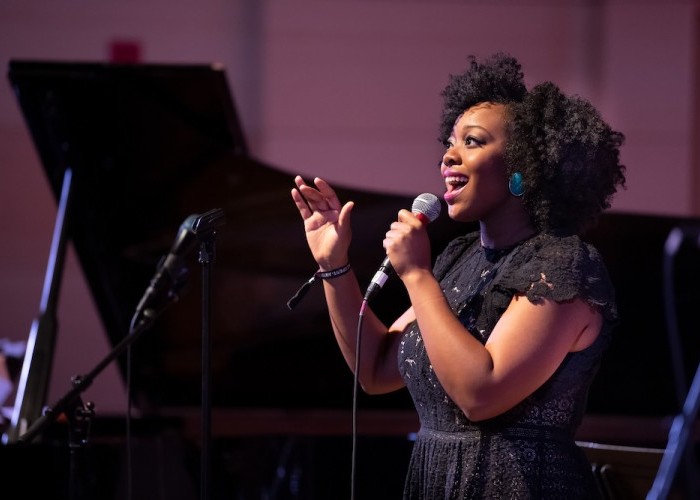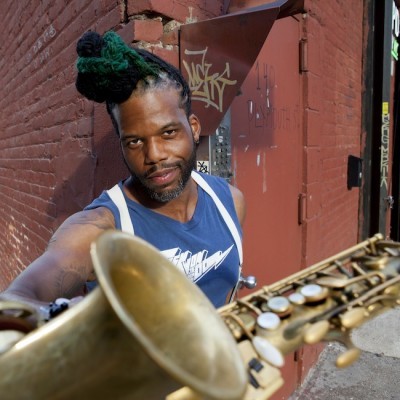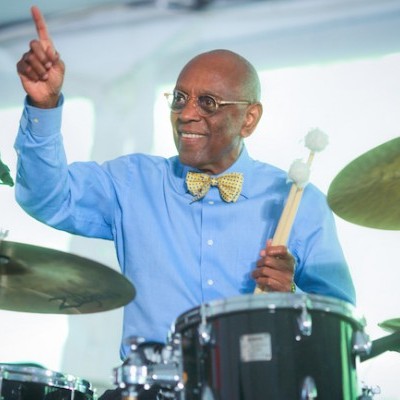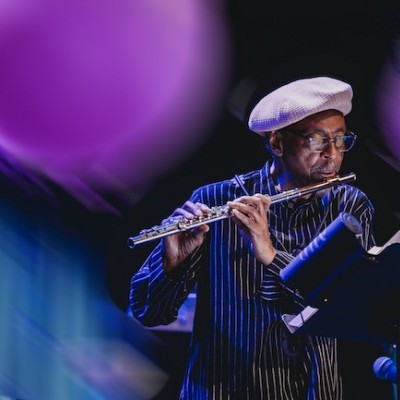Apr 2, 2024 12:59 PM
Saxophonist, Sonic Explorer Casey Benjamin Dies at 45
Casey Benjamin, the alto saxophonist, vocalist, keyboardist and producer who stamped his distinctive sounds on the…

Like so many singers before her, Alicia Olatuja’s talent was shaped in the sanctuary.
(Photo: Steven Sussman)When singer Alicia Olatuja steps on stage, she is sure-footed, and a smile almost always rests on her face.
She reaches for the microphone like a too-long-gone friend, and her fingers grip it lightly as she centers herself. There is a moment of stillness, and then Olatuja opens her mouth. Her alto voice—rich as coffee, fluid as mercury—reveals a woman completely at ease with her artistry. She’s also a newlywed, madly in love.
“I just got married in September,” she said in early November, seated at a table inside the empty conference room of an upscale hotel in Richmond, Virginia. “His name is Juan Pablo Pastor,” and he’s just as beautiful as his name, according to Olatuja. Pastor is an Argentina-born fusion percussionist; Olatuja said he fundamentally understands her, both as a musician and a woman. “[Our relationship] works out, because I think if you weren’t a musician, you’d probably get tired of all the noise—me walking around singing all the time; him, practicing all his tunes,” Olatuja said with a chuckle.
Olatuja was in Richmond as part of a vocal trio powering “Songs of Freedom,” a project under the musical direction of drummer Ulysses Owens Jr., her friend of more than a decade. Olatuja, alongside jazz singers René Marie and Theo Bleckmann, delivered customized versions of 1960s American classics, songs originally performed by vocalists who used their voices to convey protest messages through their music: Nina Simone, Abbey Lincoln and Joni Mitchell.
For Owens, who displays brilliance not only as a Grammy Award-winning drummer but now also a band-leading music director, Olatuja was a natural fit for the project.
“She was the perfect combo of a fresh-sounding voice and a true vocal technician,” he said by phone from Milan, where he was touring. The Alicia Olatuja he knows isn’t just the latest singing sensation; she is a master artisan whose craft is musicianship. “I love people who don’t just have their own voice, but who understand their instrument and how to play it well, and who use it to say something meaningful. That is Alicia.”
Those skills are demonstrated on Olatuja’s new album, Intuition: Songs From The Minds Of Women (Resilience Music), out Feb. 22. The album is the latest peak in a lifelong journey through music.
But Olatuja learned her first musical lessons in the schoolhouse and church. Born in Washington State, she moved with her family to Oregon as a toddler and then to St. Louis when she was 5. She discovered her voice in kindergarten.
“I loved Whitney Houston, and I would sing ‘Saving All My Love For You’ to my crush. He was terrified,” she said dryly.
Like so many singers before her, Olatuja’s talent was shaped in the sanctuary; she was raised in the Seventh-day Adventist faith.
“Church music, sacred music, is not about you. ... In a sense, it’s music that the singer uses to point the listener to the divine. So, you’re actually using yourself as a prism; it passes through you, but points in a different direction.”
A number of legendary black musicians—including A Tribe Called Quest lyricist Phife Dawg, 1950s jazz chanteuse Joyce Bryant, r&b heavyweight Brian McKnight and Prince—also were born into the SDA faith. The 18.5 million members of the church, represented in countries around the world, live by strict ethical edicts. In addition to abstaining from alcohol, tobacco and “unclean” meats like pork, Adventists view themselves as stewards of God’s creations.
Olatuja’s grandmother, Lucille Mitchell, was head elder of their church, the first woman to inhabit the role in their congregation. Olatuja grew up hearing that she had inherited Mitchell’s “proactive, ambitious” spirit. Her mother, Valencia, also was a force in Olatuja’s young life, and a singer in her own right, though she didn’t pursue a career in music. The women around her modeled for Olatuja a distinctive kind of feminine strength, cloaked in grace and tough love. And they believed in her gift, so she believed in it, too. The spiritual fervor and musical dynamism that flavored Olatuja’s early experiences were emotionally powerful, but could have been costly.
“I noticed a lot of my friends in church, they were getting calluses on their vocal chords, nodes were forming. ... They were singing from this place of raw emotion, which is a beautiful place. But if it causes you to hurt yourself, so you can’t sing, then it’s counterproductive. I didn’t want that to be my story.”
Instead, she went “from singing in church to singing classically and trying to understand my instrument.” After a brief stint double-majoring in veterinary medicine, Olatuja focused her college studies on music, and went on to earn a master’s degree in classical voice/opera from the Manhattan School of Music.
An international audience learned Olatuja’s name when she sang a solo during “Battle Hymn Of The Republic” at President Barack Obama’s second-term inauguration on Jan. 21, 2013. Olatuja, whose high-flying vocalizations scaled the summit of her register, was surrounded by the ethereal, harmonic power of the Brooklyn Tabernacle Choir, complete with blaring brass and swelling strings. It was a stirring performance, but Olatuja holds only a few stark memories of the historic moment in her mind.
“I remember just seeing a sea of people,” Olatuja said. “I remember feeling very warm while I was singing—and it was freezing out there. Sometimes you remember the feeling more than the visual, you know?” From her vantage point on the stage, she couldn’t see the famous faces in the audience, just the tops of their heads. “I wasn’t nervous; I felt prepared and so supported by the people in the choir. ... I felt like, we’re all here in this moment to experience something that will never happen again.”
Olatuja’s new 13-track album, Intuition, is a collection of songs old and new, all written by female composers, herself included. The importance of women’s experiences, and how those experiences shape American society, framed Olatuja’s approach to crafting the record.
“It was amazing to see the parallel of struggles and victories that women have had to endure and continue to push through, over and over again,” she said. “Some tunes are from the 1970s, some of them are from 2017; just seeing how there’s this throughline of strength and perseverance—strength but not hardness—is amazing.”
Producer Kamau Kenyatta, a longtime collaborator of vocalist Gregory Porter, became enthralled by Olatuja’s voice after hearing her rendition of “Human Nature” on her first album. When Porter wanted to harmonize on his 2016 studio album, Take Me To The Alley (Blue Note), Kenyatta said, “I’ve got the person,” and that person was Olatuja. Featuring Porter’s smooth sound and the vocal gifts of Olatuja, Lalah Hathaway and Kem, the album earned a Grammy in 2017 for Best Jazz Vocal Album. Kenyatta remained intrigued by Olatuja’s talent, and, in Spring 2017, sought a way to further their relationship.

Benjamin possessed a fluid, round sound on the alto saxophone, and he was often most recognizable by the layers of electronic effects that he put onto the instrument.
Apr 2, 2024 12:59 PM
Casey Benjamin, the alto saxophonist, vocalist, keyboardist and producer who stamped his distinctive sounds on the…

“He’s constructing intelligent musical sentences that connect seamlessly, which is the most important part of linear playing,” Charles McPherson said of alto saxophonist Sonny Red.
Feb 27, 2024 1:40 PM
“I might not have felt this way 30 to 40 years ago, but I’ve reached a point where I can hear value in what people…

Albert “Tootie” Heath (1935–2024) followed in the tradition of drummer Kenny Clarke, his idol.
Apr 5, 2024 10:28 AM
Albert “Tootie” Heath, a drummer of impeccable taste and time who was the youngest of three jazz-legend brothers…

“Both of us are quite grounded in the craft, the tradition and the harmonic sense,” Rosenwinkel said of his experience playing with Allen. “Yet I felt we shared something mystical as well.”
Mar 12, 2024 11:42 AM
“There are a few musicians you hear where, as somebody once said, the molecules in the room change. Geri was one of…

Henry Threadgill performs with Zooid at Big Ears in Knoxville, Tennessee.
Apr 9, 2024 11:30 AM
Big Ears, the annual four-day music celebration that first took place in 2009 in Knoxville, Tennessee, could well be…